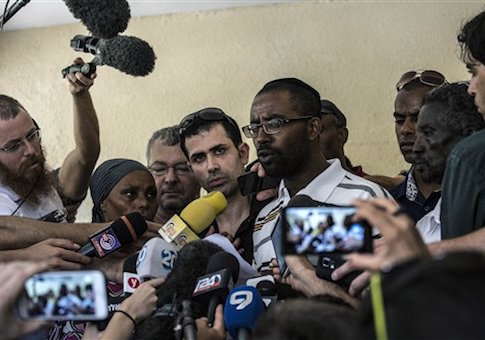JERUSALEM—Two Israeli citizens, an Ethiopian immigrant and a Bedouin, are being held prisoner by Hamas after separately crossing the border into Gaza months ago on their own volition, Israeli officials said Thursday after a gag order was lifted by the courts.
Israeli officials are braced for a prolonged period of haggling over the price Hamas will presumably ask for the two men. Five years after Hamas succeeded in capturing an Israeli soldier, Gilad Schalit, in 2006, Israel released more than 1,000 Palestinian prisoners in exchange for him.
Israel had remained silent on the disappearance of the two men in the hope that their release would be arranged on humanitarian grounds since neither was, or had been, a soldier and because both reportedly had psychological issues.
The Ethiopian immigrant, Avraham Mengistu, 29, crossed into Gaza last September through a broken fence on the Mediterranean coast marking the border between the Gaza Strip and Israel. An Israeli official said Mengistu had not served in the army because of mental health issues.
Jerusalem Post columnist Gershon Baskin, who has contacts with Hamas officials, said sources told him that Mengistu had been detained for questioning.
"They determined that he was not mentally stable and decided to return him to Israel," Baskin said. "He refused to go back and was released in Gaza."
Palestinian sources told foreign intermediaries that he left the strip through one of the smuggling tunnels on the Egyptian border on his way back to Ethiopia.
Israeli officials, however, said Thursday that they know he is being held in Gaza, as is the missing Bedouin, whose name was not given. Israeli security sources described the Bedouin, who crossed into Gaza about three months ago, as a young man "with light psychological issues who has a history of crossing into Jordan, Egypt and Gaza." Hamas has acknowledged that he is being held captive.
Prime Minister Benjamin Netanyahu said Israel holds Hamas responsible for the safety of the two men. He called on the international community "which expresses its concern for the humanitarian situation in Gaza to issue a clear call for the release of the two civilians".
Hamas is also holding the remains of two Israeli soldiers who were killed in Gaza during last summer’s war. There have been talks about transferring the remains to Israel, but a Hamas leader has said there would be no serious negotiation until Israel releases 80 Hamas activists arrested on the West Bank last year.
The activists were detained during the search for three Israeli youths who were murdered by a Hamas cell as they were hitchhiking. All those arrested were part of the prisoner exchange for Cpl. Schalit three years before.
Hamas declared the release of the re-arrested men as a precondition to actual negotiations for the return of the remains of the two soldiers. Hamas will likely demand more prisoner releases. The addition of two live Israelis to the equation complicates the situation. Israeli officials have vowed never again to pay a price like the one paid for Schalit.
Many of those released in the Schalit deal have since been involved in terror activities, say Israeli officials.
A spokesman for Hamas in Gaza, Salah Bardawil, said that "we don’t have any information" about Mengistu.
However, Hamas political leader Khaled Mashaal, alluded this week in Qatar to two Israelis being held in Gaza in addition to the remains of two soldiers.
A surprising aspect of the affair is that Israeli security officials kept it secret from even senior ministers—Netanyahu and Defense Minister Moshe Yaalon were exceptions—and from the Knesset’s ultra-discreet Foreign Affairs and Defense Committee in an attempt to keep the two missing men’s situation a low-key humanitarian issue out of the public limelight. However, rumors of the men’s presence in Gaza were rife in Arab media in the region and the Arabic social media. This presumably persuaded the courts to accede to a request from two newspapers to lift the gag order.
